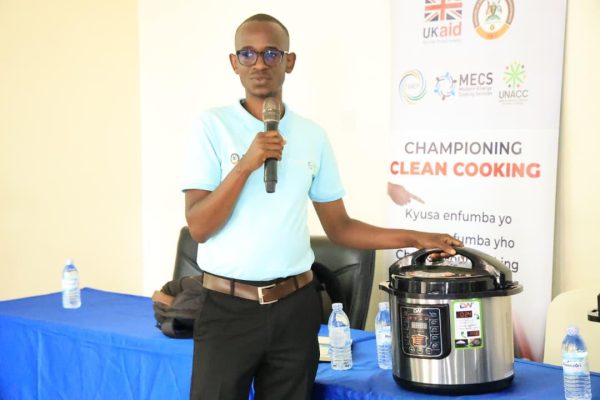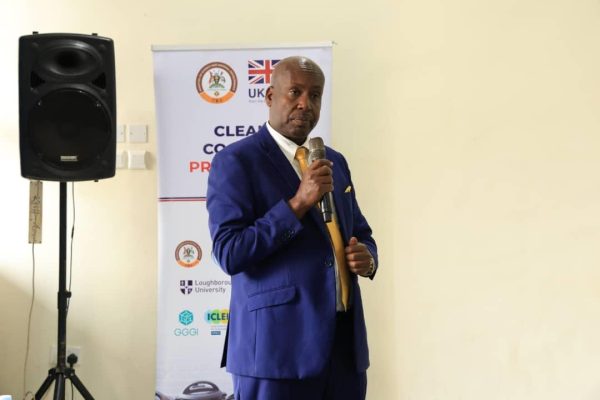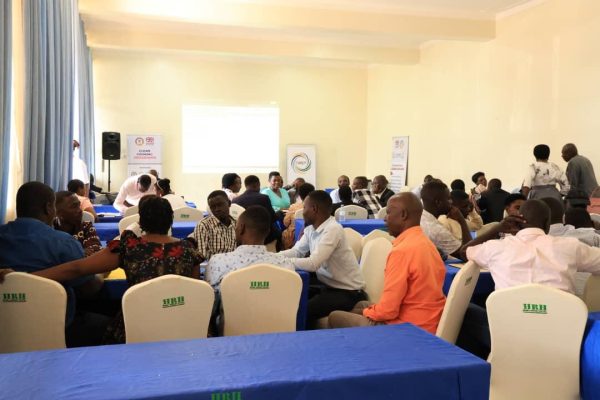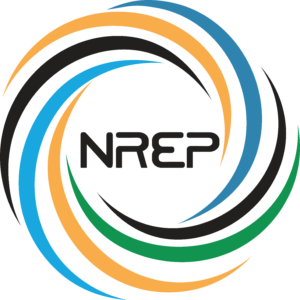On 27th August 2025, the National Renewable Energy Platform (NREP) held a Champions’ Training Workshop in Hoima Municipality as part of the Behavioral Change Communication for e-cooking (BCCeC) Project. The initiative is funded by the UK government through the Modern Energy Cooking Services (MECS) programme and implemented by the National Renewable Energy Platform (NREP) on behalf of the Ministry of Energy and Mineral Development (MEMD).
In preparation for the clean cooking champions training in Hoima Municipality, potential clean cooking champions were identified through a comprehensive questionnaire distributed during awareness campaigns. Participants who expressed interest in championing clean cooking were selected based on their responses and subsequently invited for a follow-up training to equip them with the necessary skills and knowledge. The NREP clean cooking champions training aims to empower these individuals to promote clean cooking practices within their communities, thereby contributing to a healthier and more sustainable environment.
The workshop successfully brought together key stakeholders and champions from various sectors, including the Assistant Resident City Commissioner (ARCC) of Hoima City, religious leaders, local councilors, teachers, and other respected community representatives. Their active participation and valuable contributions have greatly enriched the discussions and outcomes of this engagement. We extend our sincere appreciation to all attendees for their commitment to driving positive change in our communities.

Key Highlights and Observations
One of the key takeaways from the workshop emerged through the Mentimeter exercise, an interactive digital tool used to anonymously gather participant responses in real time. The activity was designed to surface common community beliefs and challenges related to electric pressure cookers (EPCs).
What stood out from the submissions was;
- Widespread Misconceptions: Participants highlighted deeply rooted beliefs within their communities that continue to hinder the adoption of electric pressure cookers (EPCs). Many shared that EPCs are commonly perceived as unaffordable and reserved for the wealthy. Others noted persistent fears around safety, with concerns that the devices could explode or cause burns. Additionally, there is a widespread assumption that EPCs cannot cook traditional foods properly—such as matooke, beans, or millet porridge—and that the cost of electricity makes their regular use financially unsustainable for the average household.
- Reflection of Lived Experience: What stood out most also was how strongly these misconceptions mirrored the daily realities and resistance that champions themselves encounter in their advocacy work. The honesty of the responses indicated a clear-eyed understanding of the communication barriers that lie ahead.
- Shifting Perspectives: Some champions shared that, even within the room, certain beliefs had previously gone unchallenged until the exercise brought them to light. This sparked a broader reflection on the importance of tailored, evidence-based messaging when promoting clean cooking.
- A Sense of Shared Purpose: The exercise created a sense of solidarity among champions — realizing they are not alone in facing skepticism from their communities. This recognition fostered more strategic thinking on how to collaboratively tackle misinformation.
Key Stakeholder Speakers
Dr. Paul Nduhuura the Head Capacity building and Research at NREP: He encouraged champions to refresh their minds towards clean cooking, stressing that it’s not firewood or charcoal smoke that makes food tasty, but how we prepare it. He also encouraged the champions to “pick a leaf” from successful clean cooking initiatives in kabale district especially from the kabale clean cooking ladies.
Mr. James T. Kashaya, Assistant RCC Hoima City, encouraged champions to become ambassadors for clean cooking technologies in their communities, emphasizing their crucial role in driving adoption and supporting government efforts to promote sustainable energy practices.

Key Challenges and Lessons Learned
Key Challenges
- High Upfront Costs: EPCs and related appliances are expensive, with few financing options available for low-income households.
- Limited and Unreliable Electricity Access: Many areas face inconsistent power supply or lack grid connectivity altogether.
- High Electricity Costs: Concerns about rising electricity bills discourage households from using electric cooking solutions.
- Safety Concerns and Product Mistrust: Fears of electrical accidents and counterfeit products reduce public confidence in EPCs.
- Cultural Beliefs and Misconceptions: Widespread myths persist—such as EPCs being unable to cook traditional foods or that smoke is harmless.
- Resistance to Change: Negative mindsets and attachment to traditional cooking methods hinder adoption.
- Knowledge Gaps: Limited awareness and understanding of how e-cooking works prevent uptake and confident use.
Lessons Learned
- Behavioral Change is Essential: Adoption depends on shifting mindsets and cooking habits.
- Safety is a Priority: Users must be trained to use EPCs safely and correctly.
- Champions Need Continuous Support: Ongoing training builds confidence and advocacy skills.
- Collaboration is Crucial: Partnerships across sectors strengthen clean cooking efforts.
- Awareness and Advocacy Matter: Sustained outreach is key to changing public attitudes.

Conclusion and Next Steps
Conclusion:
The Hoima Champions’ Training Workshop was a significant milestone in building grassroots advocacy for clean cooking. By equipping champions from government, religious institutions, schools, and the wider community, the initiative ensured that clean cooking messages will be spread across diverse audiences. With their new skills, resources, and action plans, the champions are now better positioned to influence attitudes, dispel myths, and promote sustainable cooking practices.
Next Steps:
Going forward, the champions will roll out their action plans through schools, churches, mosques, SACCO groups, community meetings, and media platforms. These engagements will focus on raising awareness, demonstrating practical cooking methods, and countering myths and misconceptions that hinder the adoption of clean cooking technologies.
NREP and UNACC will continue supporting the champions through follow-up missions, provision of resources, and monitoring progress. Partnerships with local leaders and institutions will also be strengthened to expand outreach, improve access to financing, and sustain momentum towards making clean cooking a community-wide practice in Hoima and beyond. Finally, Champions were given practical resources including tips, recipes, and e-cookbooks to help them confidently demonstrate and promote clean cooking.



